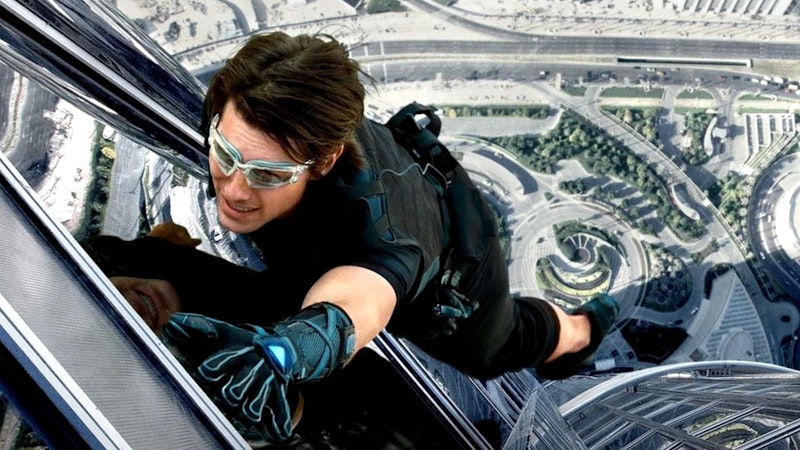Mission: Impossible Ghost Protocol, the fourth movie in the series rebooting the 1966 TV show, is a perfectly acceptable standard-issue blockbuster. That was true in 2011, when it was released, and it’s close to true now. Since “standard-issue blockbuster” is what the film aims for, it’s in a sense a success.
But Ghost Protocol came out when superheroes were ascending to the top of the box office; 2012 would see The Avengers make a billion dollars. Why does this movie, which isn’t a superhero movie, still feel like one of the most average plain-vanilla blockbusters to come out of American cinema?
Let’s stipulate that it’s an improvement on its immediate predecessor in every aspect of the film-watching experience except the plotting. It’s more colorful, the soundtrack’s more varied and interesting (despite being composed by the same guy, Michael Giacchino), the pacing’s more consistent, and there’s a sense of freedom and joy in the way director Brad Bird moves his camera around.
The plot’s a framework to hang set-pieces on. After an American agent’s assassinated and nuclear codes stolen, elite spy Ethan Hunt (Tom Cruise) is broken out of a prison in Russia to get the codes back. An attempt to infiltrate the Kremlin goes awry, and Hunt, his team, and analyst William Brandt (Jeremy Renner) are left on the run. They go to Dubai to follow the assassin (Léa Seydoux) as she sells the codes to the master villain (Michael Nyqvist) who hired her, then it comes to a climax in Mumbai as a nuke’s lobbed in the general direction of Seattle.
Nothing too deep, but nothing objectionably stupid. There’s even a passable subplot about Hunt’s wife’s death and Brandt’s involvement. The problem is that the story collapses if, at any point after about the first third of the movie, you stop to think “wait, why are they doing this again?”
Like a video game, Hunt and company always get just enough information to know where to go and what they’re supposed to do to fulfill a specific objective. Further, the biggest set-piece in the film, the Dubai operation, makes no sense. In theory the team wants to stick a tracer on the bad guy, but the elaborate scheme’s a pointless risk for minimal benefit—they could just follow the guy, or slap a bug on him some other way.
Still, in his first live-action movie Bird does an excellent job of keeping the action moving quickly enough that we don’t notice the clunkiness. The script’s officially by Josh Appelbaum and André Nemec, with an unbilled rewrite by Christopher McQuarrie; not uncommon with blockbuster movies, rewriting was still going on during filming. In this case, it happened not to pull together into a satisfying whole.
Yet if the story falls apart, there’s still real moment-to-moment charm. The set-pieces are well-constructed; they keep topping themselves. Like magic shows, you wonder what happens next, and ever-more-unlikely rabbits keep coming out of ever-more-unlikely hats.
The editing’s quick and relaxed; the movie seems like it was put together by people having fun. At times there’s an almost classic-Hollywood feel. Tom Cruise jumping around the exterior of the Burj Khalifa recalls Errol Flynn swashbuckling in a way most stunts in contemporary movies don’t.
Unfortunately, the Dubai sequence overshadows the third-act climax, which boils down to a desultory one-on-one hand-to-hand fight between Hunt and the personality-free villain in an automated car factory. The setting recalls the bloated droid factory scene in Attack of the Clones, and recalling one of the Star Wars prequels is never good.
Meanwhile, the good guys fail to prevent a Russian nuclear missile being launched. Luckily the American military doesn’t retaliate, giving the team the chance to disarm it remotely. Improbability’s piled on improbability, standard for this sort of film, but in this case it overbalances. The charm of the film can’t win the race against its goofiness.
But it became one of the highest-grossing films of the year, so it did what it set out to do. A critical viewer might be depressed that a stupid movie made a lot of money; an optimistic one might be happy that audiences responded to something otherwise well-crafted. I think you can also step back and look at where Ghost Protocol fits in with other moneymakers.
It’s often held that super-heroes are the currently dominant form of the blockbuster, but I’m not sure that’s true. There was a time when Singer’s X-Men films, Nolan’s Batman films, Raimi’s Spider-Man films, and the early MCU movies were well-reviewed and made surprising amounts of money. But with the exception of a couple of the X-Men movies, all those were before The Avengers and the consolidation of the Marvel brand.
Recent years have seen the Deadpool movies do well and the 2022 Batman was fairly well-received; returns for James Gunn’s Superman look promising. But most super-hero films haven’t hit their targets creatively or financially. Even the 2019 Shazam! couldn’t follow up its moderate success with an equally successful sequel.
Spy stories, though; those keep making money. James Bond, Jason Bourne, Ethan Hunt, these characters are reliably popular. Throw in related guys-with-guns-and-explosions films like the John Wick movies, the Jack Reacher movies, the Fast and Furious movies, and you can’t help but think that Hollywood does best with simple straight-ahead action. No high-concepts, just shootouts.
In that sense, Ghost Protocol is an average blockbuster. It’s not a great movie, but it’s good at what it does, and in how it entertains the viewer at any given moment. For the purposes of the box office, that’s success.

